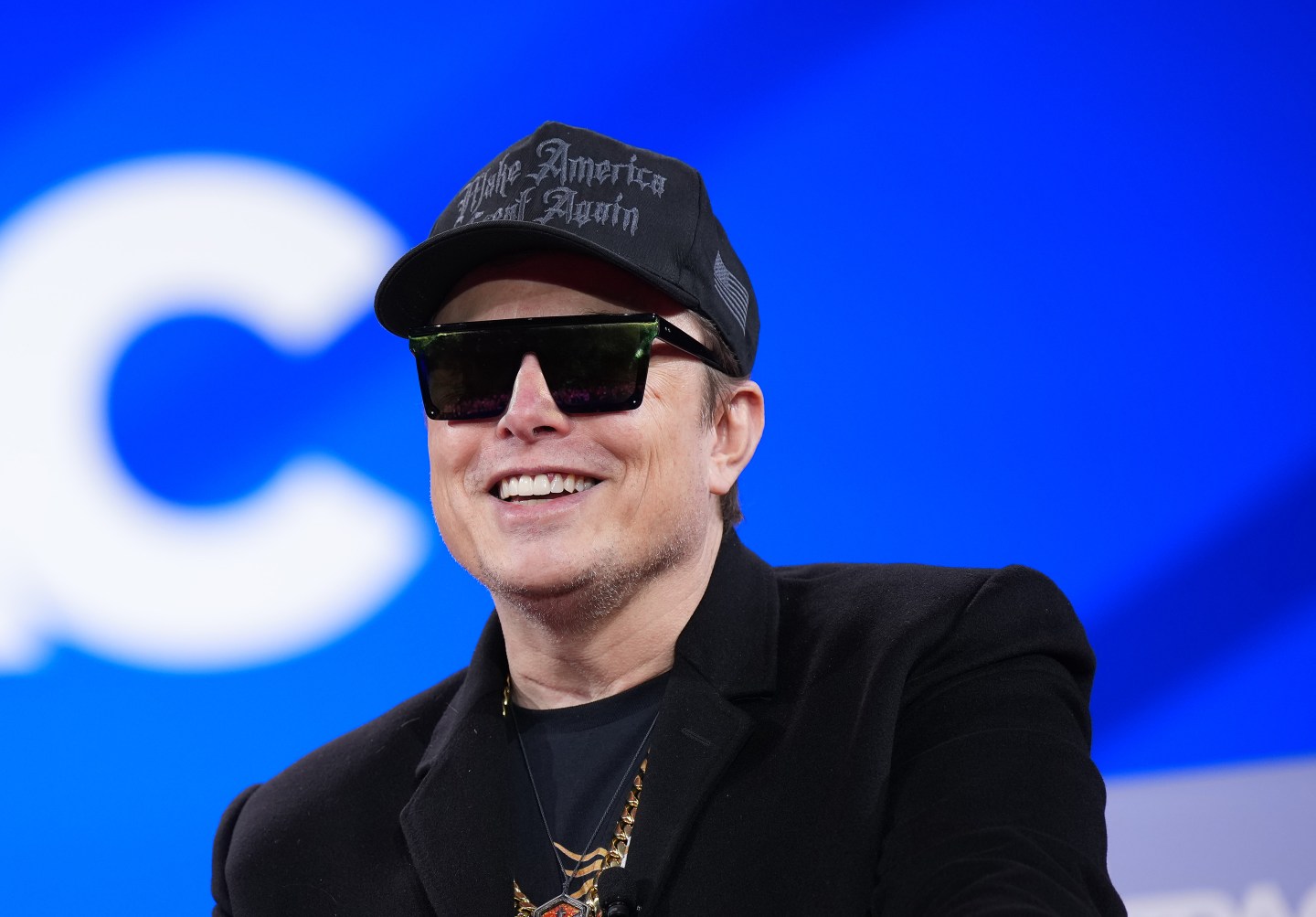Good morning. Ready for a new iPhone?
With all of the published rumors about the next generations of Apple’s most lucrative product—not just the models expected to make their debut two weeks from today, but the future ones that will fold, and curve, and apparently do Sam Altman’s laundry—it hit me.
You know what Apple product I can’t wait for more than anything else? A leather phone case. (With apologies to sustainability chief Lisa Jackson.) I suppose we can all dream, eh?
Today’s tech news below. —Andrew Nusca
Want to send thoughts or suggestions to Fortune Tech? Drop a line here.
xAI sues Apple and OpenAI

Elon Musk has taken yet another shot at a company he co-founded.
The world’s wealthiest man on Monday sued OpenAI and partner Apple, alleging that the companies are stifling competition by Apple unfairly favoring OpenAI and the ChatGPT chatbot in its App Store—over, naturally, the Grok chatbot made by Musk’s rival AI company xAI.
The lawsuit focuses on Apple’s decision to use ChatGPT as an operating system-integrated “answer engine.” Apple took the step last year after its own AI work failed to impress.
The suit alleges the integration gives OpenAI data that its rivals are not privy to and incentive for Apple to boost ChatGPT in its app rankings.
It does not mention that OpenAI, backed by Microsoft, poses just as much of a threat to Apple.
“This is a tale of two monopolists,” the lawsuit reads, “joining forces to ensure their continued dominance in a world rapidly driven by the most powerful technology humanity has ever created: artificial intelligence.”
The 61-page complaint—filed in Texas federal court—is Musk making good on his social media threat two weeks ago.
“Apple is behaving in a manner that makes it impossible for any AI company besides OpenAI to reach #1 in the App Store, which is an unequivocal antitrust violation,” he wrote then. “xAI will take immediate legal action.”
This is far from Musk’s first legal action against OpenAI. Last year, he filed a federal lawsuit alleging that OpenAI, in aggressive pursuit of revenue, had betrayed its founding mission to serve as a nonprofit research organization committed to the greater good.
OpenAI countered that action with a lawsuit accusing Musk of harassment.
Responding to this latest salvo, OpenAI said simply that the lawsuit “is consistent with Mr. Musk’s ongoing pattern of harassment.” —AN
Intel warns U.S. stake could trigger ‘adverse reactions’
Like eating two too many Doritos Locos tacos, Intel has warned in a new filing on Monday that its agreement to give the U.S. government a 10% stake in the company might lead to “adverse reactions.”
Investors and employees are among those who might balk at the deal, Intel wrote—but all that is trumped—no pun intended, I swear—by concern from customers, suppliers, partners, and foreign governments.
Three quarters of Intel’s $53 billion in annual revenue comes from outside the U.S.
“There may also be litigation related to the transaction or otherwise and increased public or political scrutiny with respect to the Company,” Intel wrote.
And, of course, there’s the concern that all of this may very well change with the next administration.
The filing notes that the deal with the Department of Commerce, funded in great part by the CHIPS Act passed during the Biden administration, is dilutive to existing shareholders.
It requires the government to vote with Intel’s board of directors, reducing others’ voting rights.
Intel shares fell 4%, to about $24.50, on Monday. —AN
Tech luminaries launch pro-AI super PAC network
Silicon Valley is once again putting its money where its mouth is. And its mouth is saying: When it comes to AI, let us cook.
A number of notable tech players have invested $100 million in “a network of political-action committees and organizations,” as the Wall Street Journal puts it, to fight strict regulation against AI.
Among those backing the effort, which is called Leading the Future, is the venture capital firm Andreessen Horowitz, OpenAI president Greg Brockman, venture capitalist Ron Conway, Palantir co-founder Joe Lonsdale, and the AI company Perplexity.
“The only thing that stands in America’s way are bad policies that will cause America to lose its lead to China,” Conway wrote on social media. “We have to PLAY TO WIN.”
Led by marketing and comms pros Josh Vlasto and Zac Moffatt, the network’s stated goal is to “oppose policies that stifle innovation, enable China to gain global AI superiority, or make it harder to bring AI's benefits into the world, and those who support that agenda.”
The open question: Can LTF successfully copy the playbook of Fairshake, the crypto-focused political network that made substantial inroads in the 2024 U.S. election?
Naturally, I asked Perplexity—the chatbot, not its parent company. According to the AI, Leading the Future has “the resources, strategic backing, and bipartisan network to potentially match the success of Fairshake in the next U.S. election cycle, especially by emulating Fairshake’s targeted spending and influence tactics.” And there you have it. —AN
More tech
—Trump mulls EU sanctions for enforcers of the bloc’s Digital Services Act, or DSA, which has ensnared American tech companies.
—Perplexity launches Comet Plus. The $5/month “Don’t call it Apple News” service promises to give 80% of revenue to publishers.
—From biotech to crypto. Almost a dozen biotech firms pivoted to crypto this year for a (short-lived) stock bump.
—PDD beats quarterly revenue estimates. But the Chinese parent company of retailer Temu saw profit margins shrink amid a price war with Alibaba and JD.com.
—Google fights mobile malware. Developers who distribute apps on Android will have their identities verified starting September 2026.
—Thoma Bravo buys Verint for $1.23 billion. The private equity giant picks up the customer service automation firm shortly after acquiring HR software provider Dayforce for $12.3 billion.
—Sony wants its first-party gaming studios to “contribute more to overall revenue growth and take measured risks.”

